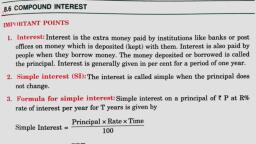Question 1 :
If $\alpha , \beta $ are the roots of the equation $ax^{2}+bx+c=0$, find the value of $\alpha ^{2}+\beta ^{2}$.
Question 3 :
The remainder when$4{a^3} - 12{a^2} + 14a - 3$ is divided by $2a-1$, is
Question 4 :
State whether true or false:Divide: $4a^2 + 12ab + 91b^2 -25c^2 $ by $ 2a + 3b + 5c $, then the answer is $2a+3b+5c$.<br/>
Question 8 :
Find the expression which is equivalent to : $\displaystyle \frac { { x }^{ 3 }+{ x }^{ 2 } }{ { x }^{ 4 }+{ x }^{ 3 } } $?
Question 9 :
Work out the following divisions.<br/>$96abc(3a -12) (5b +30)\div  144(a-  4) (b+  6)$<br/>
Question 10 :
What is $\dfrac {x^{2} - 3x + 2}{x^{2} - 5x + 6} \div \dfrac {x^{2} - 5x + 4}{x^{2} - 7x + 12}$ equal to
Question 11 :
Simplify:Find$\ x(x + 1) (x + 2) (x + 3) \div  x(x + 1)$<br/>
Question 13 :
$\alpha $ and $\beta $ are zeroes of polynomial $x^{2}-2x+1,$ then product of zeroes of a polynomial having zeroes $\dfrac{1}{\alpha }$  and    $\dfrac{1}{\beta }$ is
Question 15 :
Factorise the expressions and divide them as directed.$12xy(9x^2-  16y^2)\div  4xy(3x + 4y)$
Question 16 :
The degree of the remainder is always less than the degree of the divisor.
Question 17 :
Simplify:$20(y + 4) (y^2 + 5y + 3) \div 5(y + 4)$<br/>
Question 18 :
Factorise the expressions and divide them as directed.$4yz(z^2 + 6z-  16)\div  2y(z + 8)$<br/>
Question 19 :
What must be added to $x^3-3x^2-12x + 19$, so that the result is exactly divisible by $x^2 + x-6$?
Question 20 :
Work out the following divisions.$10y(6y + 21) \div 5(2y + 7)$<br/>
Question 23 :
State whether the following statement is true or false.After dividing $ (9x^{4}+3x^{3}y + 16x^{2}y^{2}) + 24xy^{3} + 32y^{4}$ by $ (3x^{2}+5xy + 4y^{2})$ we get<br/>$3x^{2}-4xy + 8y^{2}$
Question 26 :
State whether True or False.Divide: $12x^2 + 7xy -12y^2 $ by $ 3x + 4y $, then the answer is $x^4+2x^2+4$.<br/>
Question 27 :
What must be subtracted from $4x^4 - 2x^3 - 6x^2 + x - 5$, so that the result is exactly divisible by $2x^2 + x - 1$?
Question 28 :
What is the remainder, when<br>$(4{x^3} - 3{x^2} + 2x - 1)$ is divided by (x+2)?<br>
Question 29 :
If $\alpha , \beta$ are the roots of equation $x^2 \, - \, px \, + \, q \, = \, 0,$ then find the equation the roots of which are $\left ( \alpha ^2  \, \beta ^2 \right )  \,  and  \,  \,  \alpha \, + \,\beta $.
Question 30 :
If $P=\dfrac {{x}^{2}-36}{{x}^{2}-49}$ and $Q=\dfrac {x+6}{x+7}$ then the value of $\dfrac {P}{Q}$ is:
Question 31 :
If a polynomial $3x^4- 15x^3+14x^2+2px-q$ is exactly divisible by $x^2-5x +6$ then find the value of $p$ & $q.$
Question 32 :
If one factor of the polynomial $x ^ { 3 } + 4 x ^ { 2 } - 3 x - 18$ is $x + 3,$ then the other factor is
Question 34 :
Workout the following divisions<br/>$11a^3b^3(7c - 35) \div 3a^2b^2 (c - 5)$
Question 35 :
The equation $(\cos {p}- 1) {x}^{2}+\cos {p}x+\sin {p} =0$, in the variable ${x}$ has real roots. Then ${p}$ can take any value in the interval<br/>
Question 36 :
If $\displaystyle \alpha$ and$\displaystyle \beta$ are roots of$\displaystyle { x }^{ 2 }-2x-1=0$, find the value of$\displaystyle { a }^{ 2 }\beta +{ \beta }^{ 2 }\alpha$.
Question 37 :
If the roots of the equation $x^2 + 2bx + c = 0$ are $\alpha$ and $\beta$, then $b^2 - c$ is equal to
Question 39 :
If $\alpha$ and $\beta$ are the roots of $x^2-pX +1=0$ and $\gamma$ is a root of $X^2+pX+1=0$, then $(\alpha+\gamma)(\beta+\gamma)$ is













































